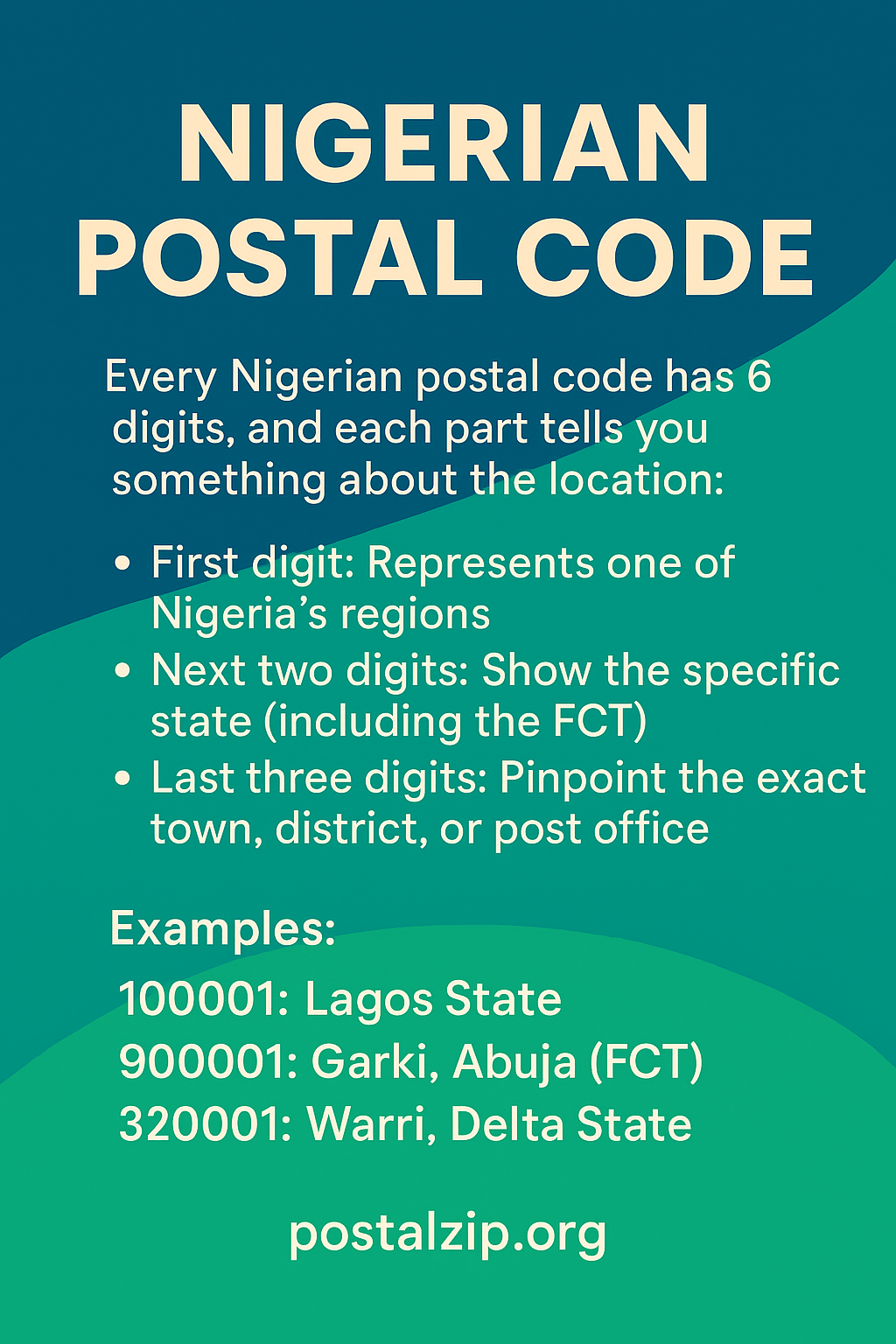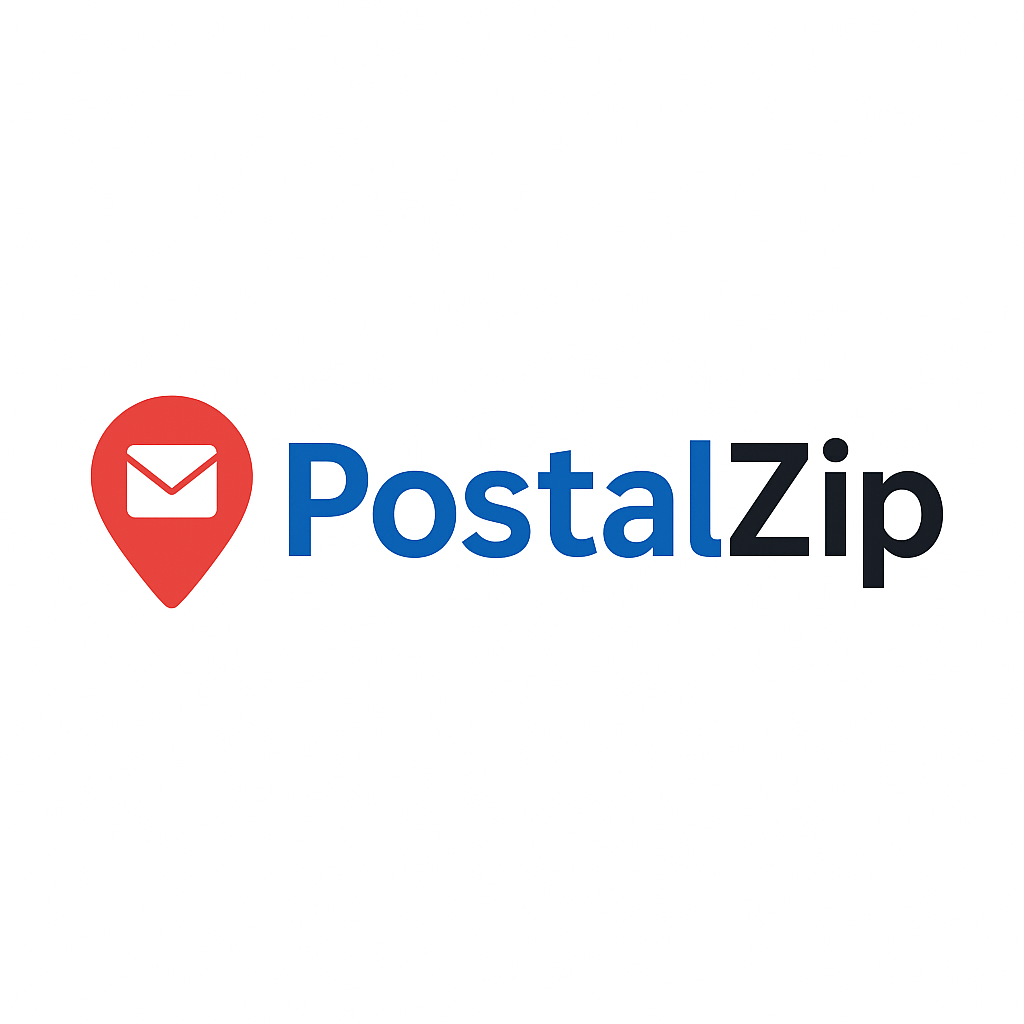If you’ve ever filled out an online form in Nigeria, chances are you’ve gotten to that little box asking for your postal code. A lot of people just type in 23401 because they think it works everywhere. But here’s the truth; Nigerian postal codes are way more specific than that. So, if you don’t want to end up using a random or wrong code, it’s worth learning how they actually work.

What Exactly Is a Postal Code in Nigeria?
A postal code is simply a set of numbers that helps the postal service know where to deliver mail. In Nigeria, this is managed by NIPOST (Nigerian Postal Service).
Unlike the United States where ZIP codes are usually five digits, Nigerian postal codes are six digits long.
How Nigerian Postal Codes Are Structured
Every Nigerian postal code has 6 digits, and each part tells you something about the location:
- First digit: Represents one of Nigeria’s regions.
- Next two digits: Show the specific state (including the FCT).
- Last three digits: Pinpoint the exact town, district, or post office.
Examples:
- 100001: Lagos State
- 900001: Garki, Abuja (FCT)
- 320001: Warri, Delta State
So instead of one universal code, every area has its own unique code.
Full List: Nigerian States, Capitals, and Postal Codes
Here are all 36 states and the Federal Capital Territory with their capital cities and main postal codes:
| State | Capital | Postal Code |
| Abia | Umuahia | 440001 |
| Adamawa | Yola | 640001 |
| Akwa Ibom | Uyo | 520001 |
| Anambra | Awka | 420001 |
| Bauchi | Bauchi | 740001 |
| Bayelsa | Yenagoa | 561001 |
| Benue | Makurdi | 970001 |
| Borno | Maiduguri | 600001 |
| Cross River | Calabar | 540001 |
| Delta | Asaba | 320001 |
| Ebonyi | Abakaliki | 840001 |
| Edo | Benin City | 300001 |
| Ekiti | Ado-Ekiti | 360001 |
| Enugu | Enugu | 400001 |
| Gombe | Gombe | 760001 |
| Imo | Owerri | 460001 |
| Jigawa | Dutse | 720001 |
| Kaduna | Kaduna | 700001 |
| Kano | Kano | 800001 |
| Katsina | Katsina | 820001 |
| Kebbi | Birnin Kebbi | 860001 |
| Kogi | Lokoja | 260001 |
| Kwara | Ilorin | 240001 |
| Lagos | Ikeja | 100001 |
| Nasarawa | Lafia | 962001 |
| Niger | Minna | 920001 |
| Ogun | Abeokuta | 110001 |
| Ondo | Akure | 340001 |
| Osun | Osogbo | 230001 |
| Oyo | Ibadan | 200001 |
| Plateau | Jos | 930001 |
| Rivers | Port Harcourt | 500001 |
| Sokoto | Sokoto | 840001 |
| Taraba | Jalingo | 660001 |
| Yobe | Damaturu | 320001 |
| Zamfara | Gusau | 860001 |
| FCT | Abuja | 900001 |
Top Postal Codes in Nigerian People Search For
| City/Area | Neighborhood/Locality | Postal Code |
| Lagos | Victoria Island | 101241 |
| Ikeja | 100271 | |
| Lekki Phase 1 | 105102 | |
| Surulere | 101283 | |
| Yaba | 101212 | |
| Abuja (FCT) | Wuse | 900271 |
| Garki | 900241 | |
| Maitama | 900271 | |
| Asokoro | 900231 | |
| Gwarinpa | 900108 | |
| Port Harcourt | Old GRA | 500101 |
| Trans-Amadi | 500102 | |
| D-Line | 500272 | |
| Rumuokoro | 500102 | |
| Woji | 500102 | |
| Kano | Nassarawa | 700282 |
| Fagge | 700213 | |
| Tarauni | 700221 | |
| Gwale | 700241 | |
| Kano Municipal | 700222 | |
| Ibadan | Bodija | 200285 |
| Mokola | 200262 | |
| Dugbe | 200263 | |
| Ring Road | 200282 | |
| Challenge | 200281 | |
| Enugu | Independence Layout | 400102 |
| GRA Enugu | 400001 | |
| New Haven | 400271 | |
| Achara Layout | 400271 | |
| Trans-Ekulu | 400281 | |
| Benin City | GRA | 300251 |
| Ugbowo | 300271 | |
| Ikpoba Hill | 300252 | |
| Oredo | 300211 | |
| Siluko Road | 300261 | |
| Kaduna | Barnawa | 800282 |
| Kakuri | 800283 | |
| Ungwan Rimi | 800271 | |
| Tudun Wada | 800212 | |
| Sabon Tasha | 800211 |
Why Nigerian Postal Codes Actually Matter
- They help courier services deliver faster and more accurately.
- Online stores use them to route packages to the correct area.
- Banks and payment platforms use them for address verification and fraud prevention.
Common wrong ideas about Nigerian postal codes
One big misconception is that 23401 is a universal code. It’s not. 234 is Nigeria’s international dialing code, while 01 is Lagos’ area code for phone calls. Put together, that’s a phone code, not a postal code. And besides, it’s only five digits, not six.
Another common mistake is thinking only Lagos and Abuja have postal codes. That’s false. Every state, every local government, and every area in Nigeria has one. You just have to find yours.
Frequently Asked Questions (FAQ)
Q: Is 23401 a real Nigerian postal code?
- A: No. 234 is the international dialing code for Nigeria and 01 is a phone area code for Lagos. Nigerian postal codes are six digits, so 23401 is not a postal code.
Q: How many digits are Nigerian postal codes?
- A: Always six digits.
Q: Do all Nigerian states and LGAs have postal codes?
- A: Yes, every state and many smaller administrative areas have postal codes assigned by NIPOST.
Q: Where can I find my exact postal code?
- A: Check NIPOST’s directory, trusted online postal-code directories, or search “[your area] postal code” (e.g., “Aba postal code”). Bookmark postalzip.org (the site shown on the infographic) for a quick lookup.
Q: Can more than one town share the same postal code?
- A: The last three digits narrow down to local post offices or specific zones. Nearby small communities may share the same last-three pattern if they’re served by the same post office, but the full 6-digit code maps to specific delivery zones. You can also find your postal code here!
Q: Do postal codes ever change?
- A: They can, but changes are rare. If NIPOST reorganizes delivery routes or opens new post offices, codes may be updated. Always verify from an official source if you’re unsure.
Q: Why do banks and shops ask for postal codes?
- A: For address verification, fraud prevention, and ensuring deliveries reach the correct location.
Final Takeaway
Nigeria’s postal codes are small numbers that make a big difference; from faster deliveries to smoother online transactions. Next time you’re filling out a form; don’t reach for 23401 out of habit. Take a second to look up the correct six-digit code for your area.
